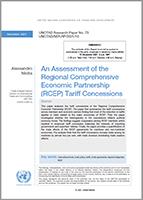
This paper analyses the tariff concessions of the Regional Comprehensive Economic Partnership (RCEP).
The paper first summarizes the tariff concessions across members and economic sectors finding that most of the reduction in tariffs applies to trade related to the major economies of RCEP.
Then the paper investigates whether the heterogeneity in the concessions reflects political economy forces. The findings suggest cooperation among RCEP members which resulted in reciprocal tariff concession balancing the interests of importing governments and exporters' lobbies.
Finally, the paper provides a quantification of the trade effects of the RCEP agreements for members and non-members economies. The analysis finds that the tariff concessions increase trade among its members by almost two per cent, with trade diversion dominating trade creation effects.


